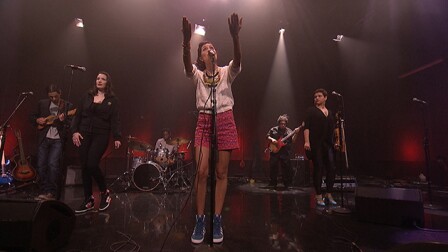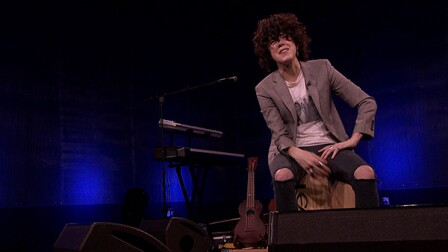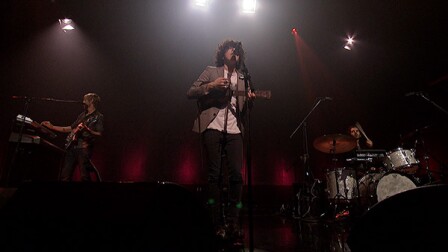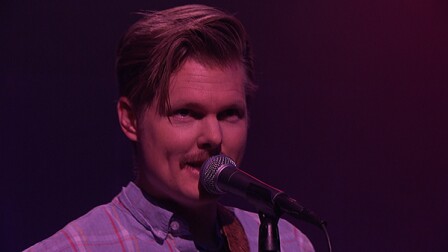
First Person: Quetzal
The Grammy-winning band Quetzal mixes sounds of traditional Mexican "son jarocho" music with a contemporary twist. Catch their lively performance on Studio A.
Discover more about Quetzal in their own words.
On the Origins of the Band
Quetzal Flores: The band Quetzal began in 1993 out of a little cafe that was called Troy Cafe. It was a Chicano owned cafe in Little Tokyo, and that's our birthplace. And since then we've been very active in building community through the music and through the band, and have had many experiences. We have also been a professional band, touring and recording albums. We're about to release our sixth album and this is our 21st year of existence.
Martha Gonzalez: I came in about two years later so I've been in the band since 1995.
On the Evolution of their Sound
QF: Naturally we've become better musicians. We've changed the way we write songs. We've challenged ourselves. I think that there's a larger palette to pull from as we went out and had more experiences and met different musicians and people in different communities and different ideas. And then that combined with the advancements in technology and the accessibility of technology and being able to record something in your own home and actually being able to spend time with a recording whereas before you had to pay for a studio so you didn't have that access as much as now. It's really accessible so I think that has really transformed the way that we write music and the way that we are able to sort of marinate in the process.
On Son Jarocho
MG: Son Jarocho is a genre of music native to the state of Veracruz, Mexico and its roots are indigenous, African, and Spanish Andalusian. But most importantly, that's the music, right? But the most important part about the Son Jarocho is that it's born in a community fiesta called a Fandango. And so I think that for one, the Son Jarocho has always been really important to Chicanos in general. I think one of the most famous Chicanos ever to bring the song Jarocho to popular culture has been Ritchie Valens. And then later, much later, different groups like Los Lobos. So the Son Jarocho has always spoken to the culture. But I think that as of lately, the fandango, the fiesta comonitaria, community fiesta is what's really has thrived here in L.A. partly I think it's because as human beings we are kind of lacking this sort of connection, like these one-on-one connections in this high tech world. And this fiesta; it's not a performance. It's a sort of musical ritual. Where people of different levels can participate. There's dancers, poetry, there's song. And people participate together. And we don't necessarily have those kinds of interactions on the daily anymore and that's something that we saw in fandango that we really gravitated to. And we started sort of inviting artists, and musicians in the tradition to come to L.A. and participate. And other people loved it as well and so you knew it many years later we have fandangos happening all over California, the rest of the United States, Washington, New York, the Midwest, Arizona. You know, all over California. I think people are really hungry to be in touch with one another on a musical and creative level.
QF: For me, in my opinion the fandango movement in Los Angeles is a sort of like the succession to the whole Zapatista experience. And being inspired by the Zapatista movement and learning about concepts like autonomy, the idea of autonomy and autonomy being this not the end all goal but a moment to be able to think clearly and dream among this madness. And so I feel like the fandango is a natural next step to that and the funny thing is that when we reached out to the fandango movement in Veracruz and began this relationship they also had drawn inspiration from the Zapatista movement. And so it was a very natural relationship that happened and so a whole group, it wasn't just the band Quetzal, it was a larger group of musicians and organizers and artists that really pulled together and concentrated their efforts on building a relationship across these borders.
The Connection Between Fandango and Community Organizing
QF: There is a direct connection between fandango and community building. It is an exercise in community building. It is being in community with music, and in music with community. It gives professional musicians like ourselves the opportunity to get off the stage and plant ourselves in community and have a role in community, an important role to play in community. And it gives other people an opportunity to share...
MG: And interact.
QF: Interact with one another and with us.
MG: So in this sense I think that Fandango and the Son Jarocho becomes like a dialectic tool that we utilize with community in order to communicate other ways. On a musical level.
On Hip Hop
QF: Hip hop is also very important to our community still. However the market system has really co-opted hip hop in a way and it has destroyed it for a lot of people. And so I feel like people are looking for something that's rooted. Really rooted, you know, in the grass roots and it's hard to find that in hip hop right now.
MG: It's out there but...
QF: These spaces have systematically been destroyed Leimert Park was a very important site for hip hop and you look at Leimert Park now as opposed to 15 years ago when even Chicanos like ourselves used to go there on a weekly basis just to experience what was happening there and to be in dialogue with that community. It's not the same place. It has been decimated. And so that is one of the main reasons why, because hip hop has been abandoned, for survival on one hand and then for the benefit of the market on the other hand.
The Connections Between Hip Hop and Son Jarocho
QF: It's about people getting together and experiencing music on this level, and about poetry, and about circle building, and a lot about these concepts that you find in African Diaspora music.
MG: It's kind of like a cypher almost. When you're in a fandango it's very similar to a cypher, where people are forming a circle and people are going back and forth, there's a call and response. The center is the tarima, which is where the percussion taking place, it's this little thing I was dancing on. But in the fiesta, it's much larger, it's like the size of a mattress or something, you know. Full mattress or whatever. The tarima's huge and there's dancers, and there's a whole protocol to it. It's not like a drum circle... a Venice drum circle, which are very nice. There's a whole ritual and a protocol and it's beautiful.
On the Song "Estoy Aqui"
QF: A lot of it has to do with dignity. Just that whole idea of dignity. We lived in Mexico for a year in Xalapala, Veracruz and that's as difficult as it is to live in Mexico right now. For Mexican people as little resources as there are, dignity is intact. You go to the mountains and hang out with the indigenous people there, dignity is intact. You know, so if someone still has their dignity, and this is something we learned by going and building these relationships and having dialogue with these communities, as long as someone has their dignity there's hope. And so that's the idea, that's what we really try to instill here, and not just us but our entire community represents that. Dignity and hope.
On the New Generation of Chicano Identity
QF: My parents generation responded by preparing to take up arms, you know, by an armed struggle against a repressive government. And which, for our generation, we're thinking about it a little bit differently. Because 1.) you can't compete with the weapons that they have. 2.) That's not where we want to go with this, they're not our teachers, you know? Martin Luther King said that. Those are not our teachers. And so we want to build these vehicles that are going to help us travel out of the way of this falling structure. And so the fandango, hip hop, and cyphering, these modes of convening, la convivencia, that important word, again that goes with dignity and hope convivencia. Those ideas are the vehicles that help us move out of the way.

On Their "Best Latin Rock Alternative Album" Grammy Award for "Imaginaries."
MG: "Imaginaries" was a long time coming.
QF: With "Imaginaries" we reached a point where it was so natural to express ourselves in this way. It does not fit in this rock box, it does not fit in this urban or Latin alternative box because that's not where we're operating from. That's not our departure point. Our departure point is so far removed from this idea of markets and from buying and selling. It's coming from a place of honesty and of real life experiences and allowing those things to organically permeate the writing process. And everybody, including everybody's voice, that's another thing that I think the Quetzal band has done very well. Everyone knows how to step back and allow somebody to occupy a space that is not maybe accustomed to occupying a space or doesn't feel comfortable doing it or whatever. There's a lot of encouragement and so everybody writes songs in this band. And this next album is pretty much even across the board. With the exception of Martha, who writes most of the lyrics and melodies. But so that's what "Imaginaries" is. And the craziest thing about "Imaginaries" is that this is the first album we wrote from long distance. We were in Seattle, and everyone else was here. So just sending files, and this was the technology point I was making earlier, to be able to record an idea and then send it, have somebody record then send it back to you, and then going back and forth. That's how we did it.
It's what Chicanos have been doing for almost a century.
MG: I mean there's long trajectory in terms of Chicano music. I think that the hybridity has always been there you know even before Ritchie Valens. So I think that as Chicanos or children of Mexican immigrants we take our traditional music, and we're growing up in the United States, we're listening to all of these different genres that are coming at us depending on which neighborhood we're living in, but I think that, like he said, once it permeates and once we begin to be creative with the music then all of these sort of sonic influences come to the surface. That's why every one of us has a different kind of upbringing that we bring to the band. So when it comes down to writing the music I think that what you hear is that fusion, it's that L.A. sound for sure. You know if you didn't know where we were from you could listen to it and know we're not necessarily from New York, we're from L.A. You can hear all of these sounds and I think it's just part of how it comes through.
QF: And Chicanos are an anomaly because the experience of music is very segregated.
Chicanos for some reason we don't necessarily subscribe to those things, because of that connection. And for African American people that connection was severed in a lot of ways even though hip hop is a connection to that and other forms of music are a connection to the African experience. But for the most part Chicanos are able to grab from different places because we have to, because this is how we survive, this is the only way we know how to exist and live and feel human again.
On the Connection to Nature
MG: This new album, our preoccupation with the Son Jarocho has always been something that's been present in our music. And a lot of the songs, their preoccupation is always been with their environment. For example they sing a lot about wakamaya, the natural worlds. We wanted to record a concept album, we've never had a concept album. We've always sort of written songs and before you know it we have enough we have an album, we record the album. But in this case we wanted to do a concept album, and we started thinking about our natural world and all of the animals that we come in contact with on a regular basis. And so we started just naming off all of these animals, city pigeons, spiders, cocoons, butterflies, we see butterflies we see ducks in city park ponds and what else we have....
QF: Coyotes.
MG: Coyotes we have, you know...
QF: Ants.
MG: Ants, that's right. So all of these we started, once we started coming up with the music we started writing and before you knew it, it just came together. And so for the Palomo song for example, when I heard the music, I started thinking of this one particular moment, we were taking the train back home, we were around Union Station, and I noticed a really tore-up pigeon. He had club foot, he had oil in his feathers, kind of sticking up on the side and he was kind of clubbing around. And I felt so bad for him. So the music that Tylana came up with, I thought of that pigeon. Everybody needs love.
QF: The moral of that story is no matter how beaten and rejected we become living in this unnatural environment, known as the city, still intact is our ability to love and our desire to be loved.
MG: Metaphor. Through speaking about animals, I think we have found that we have a lot in common with them. It's still the same sort of, as we speak through their experiences, and as we imagine their experiences we find that we have a lot in common and that we can talk about all these things in a very different way.
QF: If you listen to each album, it's the way that we approach the messages, it's always different. But there is always a message there, there's always some deeper connection. Its not just fluff or senseless pop music.
On the Kickstarter Campaign
QF: Again this goes back to the idea of autonomy and the importance. So for this album we decided to do a Kickstarter and the reason for doing that is that we feel that it is important to remain connected in this way. Our first album was before Kickstarter, before the internet, but we did a similar thing - a crowdsourced fundraising type of thing, where people would basically preorder the CD, so this is the same idea. We're asking for people to get involved in our process in a deeper way and to help us make it happen and to enhance the relationship between ourselves and people around us that want to see this thing done. And you know some people are ashamed of doing something like this and for us, it's like, are you kidding me, this is a phenomenal opportunity to remain rooted in this way. And ultimately, its relationship building and there's so much potential in that.
MF: And from a business level, I think very few people know that it's a lot smarter to do it this way, for you to own your album. When people think of record companies, people don't understand how the matrix works. So you can record an album for somebody and they own your album. You buy albums from them so that you're able to sell them and wherever your playing, they take 20 percent.
If you're album to make an album for yourself, own your album and sell them at your gigs, where most of your albums are sold anyway, especially in the way we exist, that's the best way to do it. That's your retirement. You're able to build your own catalogue. It's just a no-brainer from top to bottom and we've always been mindful of the future and the future is that, the more control we're able to have over our music, the media is so available to us now, you do extra work but in the long run, you're free. You're free to do what you want with your music. There's no big company overseeing you, controlling you, not allowing you to put your music where you want to put it.
QF: I think we've learned a lot from having peers who have gone through the other process and now find themselves in a very difficult situation, not owning any of their masters, having to jump from record company to record company or finding themselves on tour and coming home and not having any money but still having to keep up this appearance that everything is fine and great. And that's the music business, it's a big facade. And that was the Grammy's for us, we went in there and they gave us the Grammy and okay, great, and we walk offstage and they take the Grammy away. It's a prop. Go to the next station, they give you another one and pictures, and then you give it back to them again and you're like what is going on. Two hours of that. And you leave and you don't have anything.They mail it to you later. Then you look at the bottom and it says, This is not your property, this on permanent loan.
MG: It's great. I mean, it's a well oiled machine, but the most important part of that process for us was the blasts on Facebook, about how excited everybody was, like Oh, I used to see you when you played in that coffee shop or I love you guys, fucking finally, you guys are the best, I'm so happy, I cried when I saw it. Cause we were about to give some long rant about whatever, but once you start seeing that, delete delete delete. People are so proud of you, and we were proud of ourselves because they were proud of us. We were like yeah, ok, this is fun, let's just ride this. And then it dies, you come into the surf and you're trekking still. You got to shake it off and just keep doing what you're doing.











